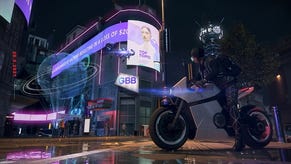Should you wait for next-gen to play Watch Dogs: Legion?
UPDATE: The PC version and its ray tracing features are put to the test.
UPDATE: While our initial focus was on the current-gen console versions of Watch Dogs: Legion, we've also spent time looking at the PC version too with Digital Foundry's PC specialist Alex Battaglia taking a good hard look at a hugely demanding game - a title that challenges mid-range rigs even without ray tracing enabled.
In this extended video, you'll get to see how the ray tracing features work, how they scale and how much of an impact they have on overall performance. You'll also get to see how much of an accelerant Nvidia's excellent DLSS implementation is for this title, plus we take a look at the settings available, how the key presets scale, and come up with our optimised settings for the best bang for the buck experience. It'll certainly be interesting to see how the Xbox Series X and PlayStation 5 versions compare to what's on offer here, and how performant they are by comparison.
Original story: Have we reached that time in the console generation where the machines start to show their limits - when developers are eagerly looking forward to the next generation? Back in 2013, prior to the release of Xbox One and PlayStation 4, titles emerged that clearly pushed too far, often resulting in poor performance. There's a decent argument that this is the case for Watch Dogs - at least on the standard vanilla Xbox One S. It's a technologically ambitious game that clearly has some performance issues, even with the arrival of a new patch. So, to what extent does the PlayStation 4 improve matters and can the enhanced machines clear up the issues? Or is this game so ambitious, we should wait to play it on PS5 and Xbox Series X?
For developer Ubisoft Toronto, delivering a game this complex across so many different systems takes a careful balancing act. Every Watch Dogs title to date, going back to the 2014 original, has evolved with more complex cities, a broadening of its ideas to show futuristic versions of Chicago, San Francisco, and now London. Legion realises the series' most exciting backdrop so far here - a great city jam-packed full of grim, utopian detail.
There's a push for more complex architecture and materials, turning it into a virtual playground that feels unusually familiar for an open world game. From the towering presence of the Houses of Parliament to the glass-stained windows of a local pub, it handles the micro and macro detailing wonderfully and it's easily the star of the show. Ubisoft Toronto has done a sterling job of meshing together the city's landmarks with the rise of new and believable tech: the drones, street surveillance, automatic cars and buses. All of it is backed up by the tentpole open world features of Watch Dogs too: the day-night cycles, weather states, the car and object destruction. It's a shorthand version of London certainly - one condensed to the highlights - but honestly there's huge value to exploring its every turnt.
So how do the various consoles stack up? As with the PC release we'll be looking at very shortly, there's a temporal upscaling option, which works to varying degrees on every console. The heaviest use is on base Xbox One, of course, where the max target resolution-wise is 1600x900, but it's dynamic and can drop to 1216x684 at its lowest on the busiest streets. Not only that, but the reconstruction causes image breakup in motion, the likes of which aren't as obvious on the enhanced machines. The Xbox One X version guns for close to 4K. it's ambitious, but in practise gets close; maxing at 3584x2016, with the lower bounds set at 1440p. Again we have some form of potential reconstruction here, but it's the clearest picture on console. As you might expect, 1080p is the upper limit for the PS4 Amateur, but it dynamically drops to 1536x864 - or 80 per cent of that top target. And as for the PS4 'Professional', it's peaking at 1620p, with drops to around 2304x1296.
That's the numbers done, but I will say there's a lot more to the image quality than just the stats. The form of temporal reconstruction in place has a big impact, especially on the base Xbox One, where the end result is often significantly blurrier and less defined. The visual feature set is fairly similar, but the enhanced machine benefits from improved screen-space reflections and improved texture filtering quality. All of the key systems carry across all platform:; the physics, weather systems, and even NPC counts appear equal between all four systems. Realising such a richly detailed city - even with some issues in streaming, and shadow pop-in at points - can't have been easy for the base machines. When it comes to performance though, they do pay a price for it and that's where the comparisons with vintage 2013 Xbox 360 and PlayStation 3 games hold water.
Xbox One is clearly at the bottom of the pile. While tutorial missions run fine, the more detailed open world and any kind of busier scene sees the frame-rate plummet, with intrusive screen-tearing. Any fast driving at all lowers the performance level too, and even with DRS and image reconstruction to help even the load, Xbox One clearly struggles. Thankfully the base PlayStation 4 improves the situation - there is more of a closer lock to 30 frames per second, but there is the sense that it doesn't quite hit the target often enough, meaning that screen-tear is perhaps too pervasive - and it's especially an issue when driving at speed. Xbox One X aims to push out as good a picture as possible for 4K displays, and by and large it does a pretty good job, though the most insanely busy city scenes with plenty of explosive action can see the frame-rate buckle.
Xbox One X appears to struggle in some cases then, perhaps as a reaction to its high resolution target of 4K. Partly this is proven by the way PS4 Pro runs. It's a much lower resolution target at 1620p, and yet has visibly less tearing across the board. It's the best performing version, with X in close second - and the fact that tearing is so infrequent is a huge plus. It's enough in my book to justify the lower resolution; a trade-off that gives us more stability from frame-to-frame. All round though, it's clear the enhanced versions are the ideal right now, though Xbox One X is not quite perfect in its delivery.
All told then, while early impressions weren't great, as things stand with the current patch, it's only really Xbox One S that truly disappoints in performance terms. With that said, the screen-tearing issues and slightly wobbly frame-rates definitely take some of the sheen away from the vanilla PlayStation 4 - and I'd say that if your plan is to move from current-gen base machines to a shiny new PS5 or Series X, it may well be worth holding fire on a Legions purchase, where the improvement should be palpable.
Thankfully the enhanced consoles are on-hand to deliver a more stable experience, though it's interesting to see another game where Xbox One X's focus on scaling up resolution results in a less stable experience overall than the rival PS4 Pro, which is where I'd choose to play in the here and now. Beyond performance boosts, I'd like to see some of the bugs addressed - all manner of glitches and crashes manifested in my various playthroughs. With next-gen though, I hope to see the performance issues comprehensively addressed and I'm really looking forwards to seeing whether the ray traced reflections hold up to the PC version, which can have a dramatic improvement to the look of the game - and finally addresses one of the most high profile complaints levelled against the original Watch Dogs. We'll be looking at the PC version very soon, then circling back for PS5 and Xbox Series coverage when the time is right.












